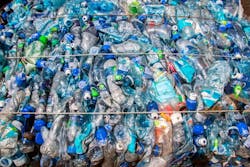Drinking from our daily firehose of 24/7 news and information has never been more overwhelming and exhausting than it is today. And in the middle of a global pandemic this year that has claimed the lives of a million people worldwide, including more than 200,000 in the U.S., the desire to find actual good news has never been more pressing.
Which made it doubly discouraging to learn last month, while compiling stories for this, our annual Sustainability Issue, that the global recycling of plastic for the last 30 years has not been what any of us had been led to believe. On the contrary, according to a jaw-dropping investigative report from National Public Radio and PBS Frontline, it appears that only 10 percent of the plastic we all have been dutifully separating at our homes, offices, and jobsites—for years!—has actually been recycled into other uses. The rest still ends up in landfills, or even worse, in our oceans!
Think about that.
Nine out of every 10 plastic bottles we toss into a blue bin still end up on the global trash heap. So, how were we all so misled? Why did industry invest so much for so long in a public relations campaign to promote something so ineffective? Well, the answer is so cynical that all of us should feel outrage. As a former head of the Society of the Plastics Industry, known today as the Plastics Industry Association, told NPR, “If the public thinks that recycling is working, then they are not going to be as concerned about the environment.”
Wow. I could go on, but in the interest of space here, I will just encourage you all to review the original reporting at www.pbs.org/wgbh/frontline/film/plastic-wars/.
So, as we now prepare for Greenbuild’s first ‘virtual’ annual conference next month, where does this leave the well-meaning global sustainability movement? Well, let’s just say it’s disappointed, but not deterred. In fact, many of us have had our doubts for years about how much of our “recycle” trash is really being repurposed. But now, learning that our best intentions were actually being manipulated may anger many and make them even more determined to make up lost ground in other areas.
After all, global warming is still very real, and recycling involves much more than just plastic. Steel, aluminum, paper, wood, and glass, all are among materials that can be effectively recycled to help the environment. So, we should expect to see a shift now, not a surrender. And paper straws. Expect to see more of those, too.
On the front burner, there actually is positive information to report, despite the enormous economic uncertainty still tied to the pandemic. Last month, the ACEC Research Institute, a new arm of the American Council of Engineering Companies, released the results of its eighth Business Impact Survey since spring. “Despite the challenging economy, an increasing majority of U.S. engineering leaders (68%) say their firm’s finances have improved or at least remained the same since COVID-19 paralyzed the marketplace in March—a significant increase over the 58% who affirmed the same in May,” notes a summary of the group’s latest report.
Polling 411 engineering firm leaders nationwide between September 15-17, the survey found that more respondents reported slightly improved cash flows since May (33% v. 28%), while slightly fewer firms expect to take additional cost-cutting measures over the next 90 days, compared to May (66% v. 73%).
Other economic reports and industry surveys also are encouraging this fall, despite the anxiety. Please visit our website, www.hpac.com, or follow updates on Twitter, @HPACEng, to see the latest. As I have said before here, we are all in this together. Our goal is to be as helpful to you and your business as we can possibly be at this historically nerve-wracking time.
#########
About the Author
Rob McManamy
Editor in Chief
An industry reporter and editor since 1987, McManamy joined HPAC Engineering in September 2017, after three years with BuiltWorlds.com, a Chicago-based media startup focused on tech innovation in the built environment. He has been covering design and construction issues for more than 30 years, having started at Engineering News-Record (ENR) in New York, before becoming its Midwest Bureau Chief in 1990. In 1998, McManamy was named Editor-in-Chief of Design-Build magazine, where he served for four years. He subsequently worked as an editor and freelance writer for Building Design + Construction and Public Works magazines.
A native of Bronx, NY, he is a graduate of both the University of Virginia, and The John Marshall Law School in Chicago.
Contact him at [email protected].
